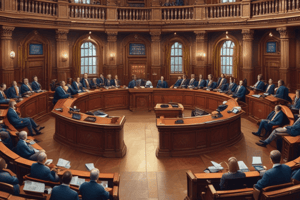Podcast
Questions and Answers
What is one of the primary roles of parliamentary peers in the legislative process?
What is one of the primary roles of parliamentary peers in the legislative process?
- Only voting on final bills
- Representing public opinion exclusively
- Debating and scrutinizing legislation (correct)
- Drafting all new legislation
How can peers influence government proposals?
How can peers influence government proposals?
- They cannot reject any legislation
- They vote on local issues only
- They can only delay decisions without any further input
- They suggest improvements and amendments during debates (correct)
What power does the House of Lords hold in contrast to the House of Commons?
What power does the House of Lords hold in contrast to the House of Commons?
- Sole authority over taxation
- Passing laws without any debate
- The ability to appoint the Prime Minister
- Delaying or rejecting government legislation (correct)
In terms of political influence, which statement is true about the House of Lords?
In terms of political influence, which statement is true about the House of Lords?
What privilege do peers enjoy while participating in parliamentary proceedings?
What privilege do peers enjoy while participating in parliamentary proceedings?
What is a key aspect of the debating process within the House of Lords?
What is a key aspect of the debating process within the House of Lords?
What distinguishes the debates in the House of Lords from those in the House of Commons?
What distinguishes the debates in the House of Lords from those in the House of Commons?
What is one of the main responsibilities of parliamentary peers in advising the King?
What is one of the main responsibilities of parliamentary peers in advising the King?
How do parliamentary peers contribute to the governance of the country?
How do parliamentary peers contribute to the governance of the country?
Which statement accurately reflects the nature of a parliamentary peer's role?
Which statement accurately reflects the nature of a parliamentary peer's role?
In what way do parliamentary peers serve as a check on the executive branch?
In what way do parliamentary peers serve as a check on the executive branch?
What factors can influence the duties of a parliamentary peer?
What factors can influence the duties of a parliamentary peer?
Flashcards
Parliamentary Peer Duties
Parliamentary Peer Duties
House of Lords members' responsibilities in debate, scrutiny of legislation, and policy input.
House of Lords Debating Process
House of Lords Debating Process
Formal process where Lords discuss and analyze proposed laws, using parliamentary rules.
Peer Legislative Scrutiny
Peer Legislative Scrutiny
Peers reviewing government proposals and suggesting improvements to laws.
Parliamentary Committees
Parliamentary Committees
Signup and view all the flashcards
Political Influence of Lords
Political Influence of Lords
Signup and view all the flashcards
Peer Privileges
Peer Privileges
Signup and view all the flashcards
House of Commons Final Say
House of Commons Final Say
Signup and view all the flashcards
Lords' scrutiny in detail
Lords' scrutiny in detail
Signup and view all the flashcards
What is a Parliamentary Peer?
What is a Parliamentary Peer?
Signup and view all the flashcards
Peer's Role in Legislation
Peer's Role in Legislation
Signup and view all the flashcards
Scrutinizing Government
Scrutinizing Government
Signup and view all the flashcards
Expert Advice from Peers
Expert Advice from Peers
Signup and view all the flashcards
Check and Balance
Check and Balance
Signup and view all the flashcards
Study Notes
Parliamentary Peer Duties
- Parliamentary peers, members of the House of Lords, play a crucial role in the UK's legislative process. Their responsibilities encompass debating, scrutinizing legislation, and providing input on policy matters.
- Peers contribute to the legislative process through debates, offering amendments, and potentially blocking bills in certain cases. Their role is distinct from that of the House of Commons.
Debating Process
- Peers engage in debates on proposed legislation and policies. These debates often involve detailed discussions and analysis of the legal and policy implications.
- The debating process in the House of Lords follows parliamentary procedure. Peers raise points, present arguments, and question government ministers.
Legislative Responsibilities
- Peers act as a check on the government. They examine government proposals, suggesting improvements, amendments, and alternatives through debates and contributions within committees.
- Peers can reject or delay government legislation, though their powers are not as extensive as those of the House of Commons.
- Their scrutiny is vital for ensuring the government account for potential consequences and to refine policies.
Committee Work
- Involvement in committees allows peers to delve into specific policy areas or bills in greater depth. These committees provide platforms for comprehensive examination and discussion.
- Committee work assists peers in understanding issues and in forming well-informed opinions and recommendations.
- They examine evidence, hear from stakeholders, and undertake in-depth research related to specific legislation or policy.
Political Influence
- The House of Lords possesses political influence as a significant deliberative body alongside the House of Commons.
- Although the House of Commons holds ultimate power in passing laws, the House of Lords can significantly impact policy decisions.
- Peers' views can shape public opinion and influence government strategies and decisions. Their status and historical weight can impact political discussions.
Member Privileges
- Peers enjoy certain privileges as members of Parliament, such as freedom of speech and protection from legal challenges regarding statements made within parliamentary proceedings.
- This principle fosters open debate and contributes to a healthy parliamentary environment for peers to share their views and information without fear of reprisal.
- These privileges contribute to a more effective exchange of ideas during the legislative process.
Assisting the King
- Although not a direct, daily activity, peers play a part in advising the Monarch on matters of governance and state affairs.
- This extends to the role of advising the Monarch within the parameters of the British constitutional monarchy, ensuring the smooth execution and implementation of the democratic government.
- These informal consultations are consistent with the constitutional role of the House of Lords in the UK's political landscape.
Studying That Suits You
Use AI to generate personalized quizzes and flashcards to suit your learning preferences.
Description
Test your knowledge on the roles and responsibilities of parliamentary peers in the UK's legislative system. This quiz will cover the debating process, legislative roles, and how peers contribute to scrutinizing government policies. See how well you understand the House of Lords and its functioning!




